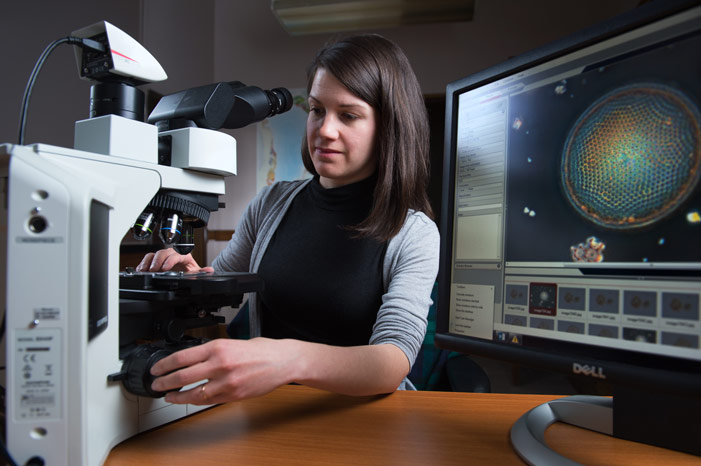UNB scientist to launch first lab of its kind in Atlantic Canada examining microscopic fossils to uncover impacts of climate change
Author: UNB Newsroom
Posted on Apr 19, 2018
Category: UNB Fredericton

UNB scientist Audrey Limoges is digging up microscopic pieces of our distant past to help understand the future of Canada’s fishing, health and tourism industries in the face of ongoing climate change.
She’s studying the ancient remains of algal organisms buried deep in the sediment of the ocean floor. These organisms, such as phytoplankton, live in the upper layers of the ocean and sink down to the seabed after they die. They are the base of the ocean’s food chain and play a crucial role in the health of the entire marine ecosystem.
The remains, or microfossils, act as a window into the past. They contain information about changes in species composition and abundance. They also show how these organisms respond to changes in marine conditions like temperature or salinity. As you delve deeper into the seafloor sediment, the window allows you to see changes stretching back to several centuries or even millennia.
“By looking at different groups of these organisms, or primary producers, we can get a better understanding of how the system as a whole might react to environmental changes,” Dr. Limoges says. “And understanding how they responded in the past can help in assessing how they might respond in the future.”
Dr. Limoges, an assistant professor in earth sciences at UNB, has been awarded $150,000 for the project through the Canada Foundation for Innovation’s John R. Evans Leaders Fund. The John R. Evans Leaders Fund helps a select number of exceptional researchers at institutions across the country conduct leading-edge research by giving them the tools and equipment they need to be or become leaders in their field. The New Brunswick Innovation Foundation matched these funds, also awarding $150,000 to the project. Another $65,000 was contributed by UNB.
“This is a significant investment that will build on the leading-edge research in environmental science happening at UNB today,” says David MaGee, UNB’s vice-president of research.
“As our region confronts the challenges presented by ongoing climate change, the work of Dr. Limoges and others at UNB provide evidence that is vital to public policy and decision-making. These funds will enable Dr. Limoges to work at the forefront of her field, addressing issues that have a tangible impact on this region, our country and the world.”
Dr. Limoges will establish lab facilities to study the microfossils of algal organisms to assess the impact of ongoing climate change on the marine coastal regions of eastern Canada, from the Maritime provinces to Baffin Island. The facilities will also allow researchers to assess trends in the development of harmful algal blooms, with the aim of creating tools to better anticipate and remediate them.
The Past Primary production and Environmental Reconstructions (PAPER) laboratory will be the only lab of its kind in Atlantic Canada and will open the door to a wide variety of research projects focused on paleo oceanographic and climatic studies.
“The research activities that will be made possible by these facilities will be highly relevant for the fishing, health and tourism industries, which are very important for the cultural identity and economy of Canadians and Atlantic Canadians in particular,” Dr. Limoges says.
“This research domain really is at the intersection between different disciplines and will reinforce the savoir-faire of UNB in the domain of environmental and climate studies. The Arctic might perhaps seem far away, but changes there ultimately can have a serious impact on the environment in and around the Maritime provinces.”
Media contact: Hannah Classen
Photo: Dr. Audrey Limoges, an assistant professor in earth sciences at UNB, is setting up a microfossil lab to assess the impact of climate change on marine ecosystems. It will be the first and only lab of its kind in Atlantic Canada. Credit: Rob Blanchard / Photo UNB.
